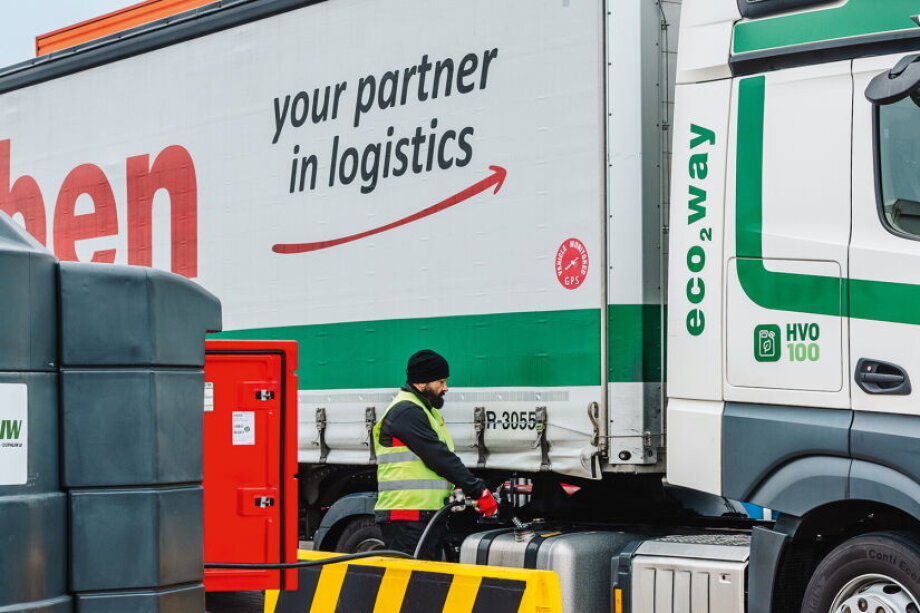HVO100 (Hydrotreated Vegetable Oil) is a biofuel produced from renewable raw materials with very high emission reduction potential. It releases up to 90% less CO2 into the atmosphere compared to the average values that the National Balancing and Emissions Management Center adopts for B0 (i.e. organic-free) diesel. As a second-generation biofuel, it does not compete with food—neither in terms of the raw materials used nor the need for farmland. It can be produced from industrial waste (e.g. vegetable and animal fats) and therefore supports a circular economy.
All this makes it an effective tool for reducing CO2 emissions. Raben Group's target is ambitious: to reduce the emission intensity of its transport activities by 10% by 2025, and to reduce Scope 1 and 2 emissions by 60.4% by 2032 (SBTi target) relative to 2020 values. To support this goal, at Raben Transport plans to achieve a 10% share of alternative fuel vehicles in our own fleet as early as this year, increasing that share to 75% within the next five years.
The future of transport seems to be electrification and hydrogen. However, in the field of heavy-goods vehicles, the dissemination of these solutions faces numerous challenges, including cost and infrastructure. We needed something with quick and measurable results, so we decided on HVO100. According to experts, it is one of the two most scalable, low-carbon ‘green’ solutions —along with renewable electricity—that can play a major role in the decarbonization process.
Raben Group took an interest in this biofuel as early as eight years ago, but at that time its availability was limited to Scandinavia. In the second half of 2023, HVO100 testing began in the Netherlands. February 2025 marks one year since the biofuel was used by Raben Transport trucks serving international routes—in Germany, Austria and Slovakia. This is also where much of the refueling of our vehicles takes place. In Poland, HVO100 is still not widely available due to the lack of appropriate regulations. The exceptions are the three public petrol stations of our partner Unimot Avia: in Bolesławiec, Myszęcin and Piotrków Trybunalski.
In this context, it is particularly valuable for us to have our own HVO100 refueling station. Launched on 12 November 2024 in Gądki near Poznań, it is supplied with fuel from Unimot and equipped with a 5,000-liter Kingspan Water & Energy bunded tank. We are planning to open another station at the Gliwice depot, and in the future, as the use of HVO100 increases in our fleet, we would like to repurpose existing diesel tanks for its storage. At the moment, a few dozen trucks belonging to Raben Transport and around 12% of Raben Group's own fleet are refueled with biofuel, however this share will certainly grow.
HVO100 is recommended by leading truck manufacturers for use in conventional diesel engines as a replacement for regular diesel. It can be used without the need for engine adaptation in most vehicles meeting the EURO 6 emission standard, and no additional investment is needed to replace the fleet or build special refueling infrastructure. Since our trucks refuel with HVO100 made from waste, the benefits are twofold: we are lowering emissions while maintaining driving performance and service delivery quality, and at the same time, we are using something that would simply be disposed of, with no benefit to the planet.
In the case of HVO100, the emission reduction potential is not only proven, but can also be confirmed with certificates. Fuel at the aforementioned Unimot Avia stations in Poland, at our own station in Gadki and at selected points in Europe—which is where we source it—has been recognized by ESG experts as having a direct impact on lowering the organization’s carbon footprint and reducing greenhouse gases. Raben Group has received confirmation from its suppliers that it is a beneficiary of the fuel properties, and therefore accounts for a certain level of emissions reduction. This is important from the point of view of reporting our carbon footprint. In addition, we can issue the certificate ourselves under the insetting option and produce emissions reports for our customers. This information may be important for companies that have their own reduction targets and are aiming to reduce Scope 3 emissions.
The HVO100 is not without its drawbacks, however. These include its limited availability and high price—several dozen percent more than diesel, depending on the country of purchase. However, data from the International Road Transport Union (IRU) shows that biofuel prices are falling. Given our ESG strategy and the reduction potential of HVO100, we believe the cost is worth it. This is an investment that Raben Transport is making together with its customers for the benefit of the environment and the decarbonization process.


